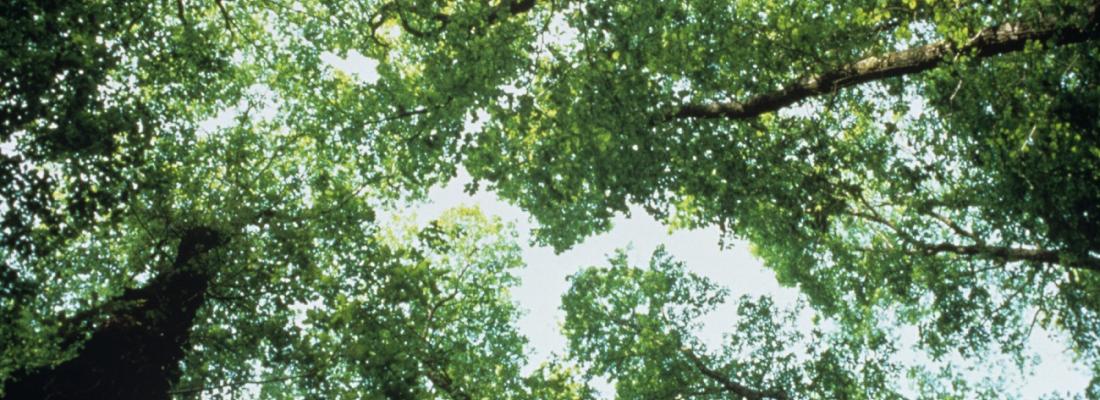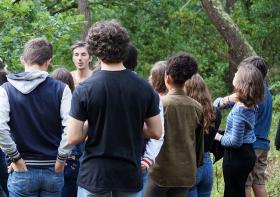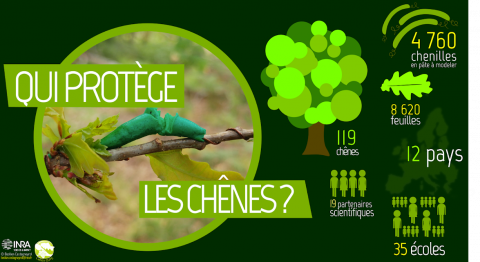Society and regional strategies Reading time 3 min
Can school children support ecological research? First lessons from the “Oak Bodyguards” research project
Published on 17 March 2020

In the “Oak Bodyguards” project, students and scientists from 17 European countries placed more than 7 000 artificial clay caterpillars on oak trees, following a detailed protocol, in order to observe the marks left by their predators. They sent their observations to INRAE researchers studying the effects of climate on tree defence mechanisms. The young participants followed the exact same procedure used by all the professional scientists involved in the project, specialized in ecology or not.
Two objectives motivated researchers to carry out the project: the first was to obtain samples and data from the entire European continent; the second, to start a dialogue with schoolchildren on the scientific approach and the implementation of an experimental protocol, showing them how their work can help scientists with their research.

To estimate the impact of predators on the studied oaks, the participants installed clay dummies on the trees—the same size and shape as real caterpillars. The predators took the bait! They attacked the dummies as if they were real prey, leaving marks of their beak, teeth, or mandibles. The next step was simply to count the marks. In 2018 and 2019, researchers received from the participants over 7 000 artificial caterpillars—that they had made, placed, and recuperated after a month—and close to 9 000 leaves from around 120 oaks. The project has now been extended for three additional years.
Data collected by students and untrained scientists show similar results
Researchers analysed all the samples, both the marks left by predators on the dummies and the damage caused by herbivores on the leaves. They also reread the estimations from the schoolchildren and untrained scientists, all of whom had followed the same protocol. The results published now refer to the quality of the data collected. Researchers from INRAE followed the same protocol to contrast the data collected by students and untrained scientists. Compared with the specialists, students and untrained scientists overestimated both the predation rates and the damage caused by herbivores on the leaves. Schoolchildren were less precise than the untrained scientists in identifying attack marks on the dummy. Conversely, they were more accurate in estimating the damage on the leaves. Their raw data cannot be used as is; a correction is needed according to the reading bias observed. However, once the bias has been taken into account, even the data gathered by schoolchildren can be analysed and used to produce results.
Beyond these conclusions, scientific literature indicates that participating in citizen science research helps schoolchildren gain confidence and motivation, and encourages a positive attitude towards science. Other tasks such as collecting and formatting data, following a protocol, or engaging in discussions with researchers are also crucial to the young participants’ scientific learning experience. The activities carried out as part of citizen science programmes contribute significantly to gaining common knowledge on ecology—and science in general—for researchers and students alike.
Learn more about the “Oak Bodyguards” project
To learn more about the scientific context and the protocols followed in the project, and to find valuable information on trophic cascade, herbivores’ enemies, plant defence and damage caused by insects in the context of climate change, visit the project’s website: https://sites.google.com/view/oakbodyguards/home/english_1

The scientific project has been extended until 2022, integrating more and more schools throughout Europe.
A comic book aiming to teach children about the participatory approach used in the project can be downloaded for free and is available in English, French, German, or Spanish: https://sites.google.com/view/oakbodyguards/home/english
A video tracing the steps of the schoolchildren that participated in the project is available (in French) at: https://www.youtube.com/watch?v=mZF-WJ3kxpo
|
Reference Castagneyrol, B., Valdés-Correcher, E., Bourdin, A., Barbaro, L., Bouriaud, O., Branco, M., Centenaro, G., Csóka, G., Duduman, M.-L., Dulaurent, A.-M., Eötvös, C.B., Faticov, M., Ferrante, M., Fürjes-Mikó, Á., Galmán, A., Gossner, M.M., Harvey, D., Howe, A.G., Kaennel-Dobbertin, M., Koricheva, J., Löveï, G.L., Lupaștean, D., Milanović, S., Mrazova, A., Opgennoorth, L., Pitkänen, J.-M., Popović, M., Roslin, T.V., Scherer-Lorenzen, M., Sam, K., Tahadlová, M., Thomas, R. and Tack, A.J.M., 2020. Can School Children Support Ecological Research? Lessons from the Oak Bodyguard Citizen Science Project. Citizen Science: Theory and Practice, 5(1), p.10. DOI: http://doi.org/10.5334/cstp.267 |
